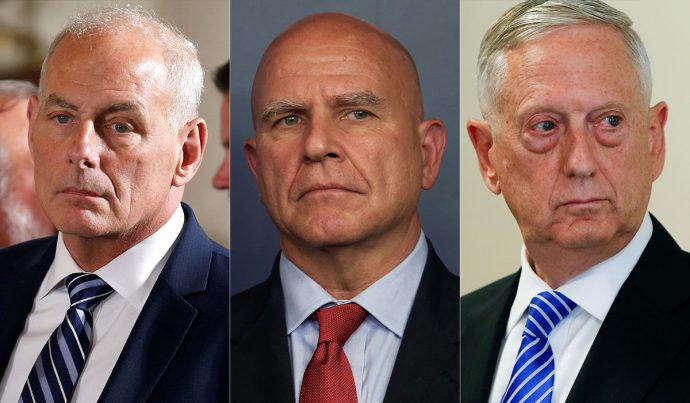As everyone knows, Trump has brought several generals into key positions in his administration.
When I write about the information war, I stress how much incredibly good information our side (political conservatives) produce on a weekly basis. Here is a great example — just imagine if more Americans knew this list after nine months of the Trump presidency.
Here is Victor Davis Hanson writing at National Review:
Recently there have been a number of quite different critiques from all political sides of Trump’s generals (Kelly/McMaster/Mattis), and also from a variety of angles (too narrow experience, an unhealthy overdose of military thinking, a “sellout” for working for the likes of Trump, etc.). While it is hard to know who exactly is to be praised or faulted for Trump’s foreign policy (e.g., Secretary of State Tillerson and, of course, Trump himself), the record is so far pretty clear — and pretty good.
I’ve separated these points from VDH into bullet points for easier reading:
- Prune away the rumors of cabinet shake-ups, “adult in the room” melodramas, tweets, fake-news accounts, and inter-cabinet spats, and we are left with a once-ascendant ISIS now shattered and in full retreat;
- a new honesty about NATO and its funding;
- an unsustainable Iran deal now on hold and sent to the Senate where as a treaty it belonged;
- honesty in describing the threat of both radical Islamic terrorism and Iranian hegemony;
- greater security on the southern border; a restored relationship with Israel and the Gulf States, and an improving one with Jordan and Egypt as well;
- a workable and constitutional immigration scrutiny of would-be entrants from war-torn Middle East countries;
- a growing deterrent stance toward Russia and China rather than the rhetoric of “reset” and the “Asian pivot”;
- an active and growing allied response to the North Korean threat; the beginnings of an all-out effort on missile defense (rather than the prior open-mic presidential promises of a “flexible” post-reelection efforts to curb it in Eastern Europe);
- a determination to rebuild the military (slowly, given the still far too large annual deficits);
- some recent incremental progress in Afghanistan due to new rules of engagement;
- the real red line that Assad cannot use WMD against civilians; a far more adult stance toward U.N. hypocrisies;
- improved autonomy abroad through increasing energy independence and trading in natural gas;
- an out from a Paris climate accord whose goals the U.S. meets anyway through free-market solutions — and the emerging outlines of a comprehensive doctrine of “principled realism” that restores deterrence.
Read more: National Review
Image credit: www.nationalreview.com.

